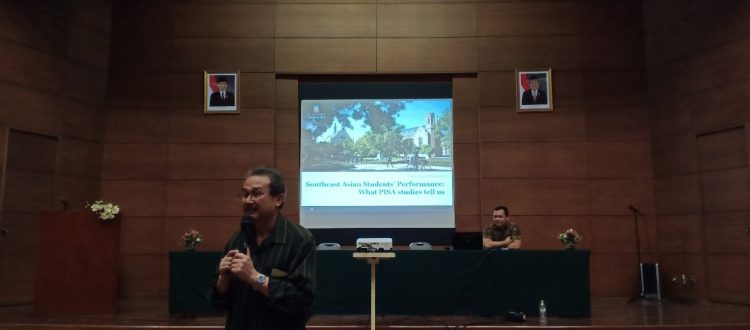General Lecture “Southeast Asian Students’ Performance What Pisa Studies Tell Us” by Dr. I Gusti Ngurah Darmawan from School of Education University Of Adelaide
Bandung, 11 October 2019
International Program on Science Education, Faculty of Mathematics and Science Education held a general lecture with the theme “Southeast Asian Students’ Performance What Pisa Studies Tell Us,” with the keynote speaker is Dr. I Gusti Ngurah Darmawan from the University Of Adelaide. The general lecture was held at the Auditorium Faculty of Mathematics and Science Education A (JICA Building) on Friday, October 11th, 2019; this general lecture is not only attended by bachelor students but also students from the school of post-graduated especially in the field of science students. The general lecture was guided by Mr. Ikmanda Nugraha, M.Pd, as a moderator.
In this general lecturer, Dr. I Gusti Ngurah Darmawan, came up with a question, “What is PISA?” which was asked to the audience, after the question is answered by some audiences, then he explained that Programme for International Students Assessment or PISA is a worldwide study by organization for economic Co-Operations and Development (OECD) in member and non member nations intended to evaluate educational systems by measuring 15-year-old school pupils scholastics performance on mathematics, science, and reading. The discussion continued with the explanation about education, he said that “education has long been acknowledged as one of the key factors to enhance the social and economic well-being and has received increasing amounts of attention and priority in many countries around the world, including those in the Southeast Asian region and Australia.”
As a future teacher, there is some challenge to increase the quality of education, such as globalization and rapid knowledge and technology. Globalizations is one of the challenges to increase the quality of education because of nowadays revolution, which is industrial revolution 4.0, that makes there isn’t any boundary in this world. As well as the population number, also the growth in the population of the five countries (Indonesia, Malaysia, Singapore, Thailand, and Vietnam) over the past 68 years has been remarkable. According to United Nations Department of Economic and Social Affairs Population Division on 2019, the population with future projections from 1950 until 2100 will totally increase, and Indonesia has the biggest graphic population above Vietnam, Thailand, Malaysia, and Singapore also Indonesia is the 4th in the world after China, India, USA.
Therefore there are, moreover, two areas where monitoring is occurring on a world-wide basis that are directly related to the field of education. These two areas are the monitoring of the wellbeing through the use of the Human Development Index and the Gender Inequality Index; and the monitoring of educational achievement, particularly concerning the foundational skills of literacy and numeracy and the learning of mathematics and the science.
Dr. I Gusti Ngurah Darmawan also showed many facts about the grade PISA on reading, mathematics, and science in some countries, such as Indonesia, Malaysia, Singapore, Thailand, and Vietnam. According to some data that has been shown, could be concluded that equity of students performance is influenced by gender equity that females mostly have a higher grade than male; and economic social and cultural equity also influence effect on how the students perform. This conclusion was gained based on the PISA index of economic, social and cultural status (ESCS) that was derived from the following three indices : highest occupational status of parents (HISEI), highest education level of parents in years of education according to ISCED (PARED), and home possessions (HOMEPOS) that comprises all items on the indices of WEALTH, CULTPOSS and HEDRES.
In the last sessions, Dr. I Gusti Ngurah Darmawan cited a good quote from Jhon Dewey “If we teach today’s students as we taught yesterday’s, we rob them of tomorrow.” Overall, the general lectures run well because the participants were enthusiastic about this topic, and ask some questions related to the topic. Contributor: Putri Sekar Melati





